The politics behind the comfort women issue
By Cheng Tzu-leong 鄭自隆
Monday, Mar 05, 2001, Page 8The old Chinese saying, "Fools ask for troubles when peace reigns over the world" might best describe the current disputes, trig-gered by the controversial Japanese comic book On Taiwan (台灣論), which says that Taiwan's comfort women (慰安婦) became sex slaves voluntarily.
When two former comfort women, 80-year-old A-tao (阿桃) and 81-year-old A-chu (阿珠), recently testified about their miseries -- proving that they were indeed deceived and forced by the Japanese troops to perform sex services -- they certainly did nothing wrong by recounting their personal experiences to accuse the Japanese government of wrongdoings. On the other hand, when senior adviser to the president Hsu Wen-lung (許文龍) was quoted in the book as saying, based on his own observations, that the comfort women had become sex slaves voluntarily, I believe he did nothing wrong either.
If we examine the history of prostitution, some girls and women were abducted and forced into prostitution while others were sold by their parents or even became prostitutes voluntarily. Since the reason for becoming a prostitutes varies from one prostitute to another, the reasons for those who became comfort women also vary. The situation is similar to the old Hindu fable, "The blind men and the elephant" (瞎子摸象). In the story, six blind men try to describe an elephant by touching only parts of its body. Some claimed that the elephant was like a wall while others insisted that the elephant was like a rope! Although they failed to give a whole picture of an elephant, none of them were lying.
While the uproar over the book and its claims continues to resound, shouldn't we all be calmly asking the question: Who will benefit from these conflicts?
First, the case was revealed and was further stirred up by some opposition legislators, who gain political benefit when the people of Taiwan's "anti-Lee" (反李), "anti-Japan" (反日), "anti-Taiwan" (反台) and "anti-Chen" (打扁) emotions are aroused. If the statement, saying that Taiwan's comfort women had become sex slaves voluntarily, did not come from Hsu, a major supporter of President Chen Shui-bian (陳水扁), then perhaps the opposition legislators would have lost interest in creating a media furor over the topic. Meanwhile, Hsu is also a close friend of former President Lee Teng-hui (李登輝). Since these opposition legislators, who usually "oppose everything proposed by Lee," have lost their target as Lee is fading out of the political stage, how could they not to seize the chance to attack Lee's friends? This is also the KMT's old trick of "wiping out the enemy's friends to isolate the enemy." In fact, that was exactly the reason the late General Sun Li-jen (孫立人) was put under house arrest by Chiang Kai-shek (蔣中正) in 1955.
Second, if a general "anti-Japan" activity can be launched through this case, Taiwan-Japan relations will be damaged and the island will be further isolated, which is helpful for those oppotion legislators to achieve their goal of re-unification between the two sides of the Taiwan Strait.
Third, the case will also lead to a contradiction among different ethnic groups in Taiwan -- and splits between the people of Taiwan have always been expected by the pro-unification groups.
Fourth, the case has become a hot potato for Chen, as he could be criticized both for dealing with it and for not dealing with it. The DPP government has been badly battered by the Fourth Nuclear Power Plant (核四) issue, theAmorgos oil spill incident and by the Cabinet's suggestion to draw up a referendum law. If the opposition can further "pour oil over the fire" and sweep Chen's prestige into the dust, they can be assured of political success.
The political trickery behind the case can be clarified easily. I do not blame the people of Taiwan for echoing the opposition legislators' words. It is, however, ridiculous that even some DPP legislators are now dancing with the opposition camp. Where has their political IQ gone?
Moreover, the media has gone out of its way to sing off key this time, giving a really bad example of journalism. When the people of Taiwan were stealing and burning the comic books, not only did the media not condemn such lawless acts, it even tried to rationalize the actions. Some opposition legislators, who have no sense of realism, went further and demanded the government to ban the book. In fact, since Taiwan's Publishing Law (出版法) was revoked, the Government Information Office (新聞局) lacks the authority for such a move, not to mention that it is a violation of the freedom of the press. The media, moreover, has devoted a lot of space to discuss the case. When we turn on the TV, the evening call-in shows are all focusing on the issue with a prejudgment, and some DPP politicians' performances of pretending to look serious on these call-in shows have been absolutely absurd.
The "Chinese legislators" (中國立委), who stirred up the case, are so good at political conflicts that they can create such chaos with only a few lines in a comic book. If they really care about Taiwanese or Chinese people, they should condemn the Chiang administration for the 228 Incident, and the Beijing government, which killed its own people with tanks in Tiananmen Square.
Politicians' words and actions should be tested. We Taiwanese people must stay calm when facing politicians. It is unnecessary for us to dance to the beat of the evil drums.
Cheng Tzu-leong is a professor of the department of advertising at National Chengchi University.
Translated by Eddy Chang
This story has been viewed 3356 times.


 本城市首頁
本城市首頁








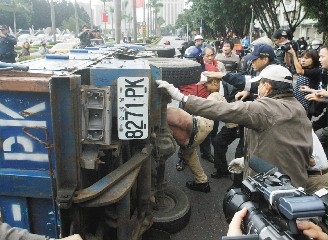


















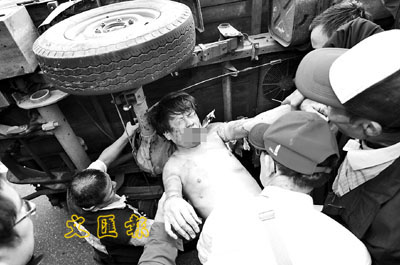
 放大圖片
放大圖片

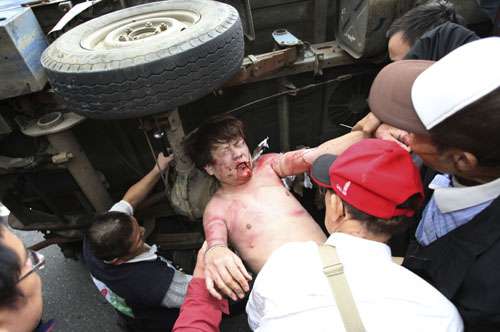






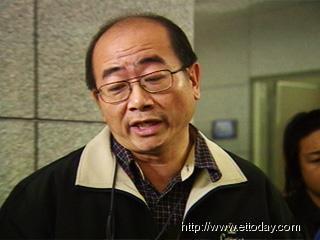






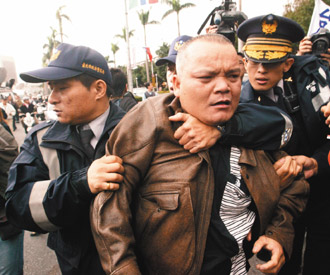


 民主紀念館大門前中山南路上又出現流血意外, 一輛貨車為了衝撞抗議的建國聯盟, 連甚至連記者也遭殃, 一群在現場拍攝採訪的記者遭到貨車直接衝撞, 包括民視攝影記者王健強腳部受傷, 東森攝影記者王瑞章整個人被輾過壓在車底下, 造成大腿骨折有腦震盪的重傷, 另外還有三立和報社的女性攝影記者都遭到了這輛貨車的撞傷。衝撞從這裡開始。貨車司機彭盛露差點撞倒兩名建國聯盟抗議人士, 警察立刻上前, 媒體趕來拍攝。透過民視記者王健強的拍攝畫面, 東森攝影記者王瑞璋就站在擋風玻璃前搶拍, 駕駛彭盛露竟然還踩油門。這時東森記者已經被輾過捲入車底, 民眾日報女記者徐玉英和中國時報記者王爵暐都被撞倒, 貨車駕駛彭盛露還想繼續逃逸。這時東森攝影記者王瑞璋被卡在車底下拖行大約十公尺, 事發突然現場尖叫聲不斷, 為了趕快救人, 大家合力把貨車翻過來, 被輾過的東森記者王瑞璋已經身受重傷。王瑞璋上身赤裸, 因為他的衣服被捲在車底已經破爛, 他左手右腳都骨折, 還造成腦震盪, 綁著紅色護身符的攝影機摔在地上整個撞爛, 零件散落一地。另外還有民視攝影記者王健強腳部受傷, 以及三立攝影記者邱盟清, 總共五名記者受輕重傷, 兩名報社攝影記者臉上滿是受到驚嚇的表情。貨車駕駛彭盛露被警方逮捕之後, 惡劣撞人行為, 引起公憤許多人朝著他追打。這起事件發生在上午十一點多, 民主紀念館大門對面的中山南路上, 過程一片混亂, 怵目驚心。(民視新聞綜合報導)
民主紀念館大門前中山南路上又出現流血意外, 一輛貨車為了衝撞抗議的建國聯盟, 連甚至連記者也遭殃, 一群在現場拍攝採訪的記者遭到貨車直接衝撞, 包括民視攝影記者王健強腳部受傷, 東森攝影記者王瑞章整個人被輾過壓在車底下, 造成大腿骨折有腦震盪的重傷, 另外還有三立和報社的女性攝影記者都遭到了這輛貨車的撞傷。衝撞從這裡開始。貨車司機彭盛露差點撞倒兩名建國聯盟抗議人士, 警察立刻上前, 媒體趕來拍攝。透過民視記者王健強的拍攝畫面, 東森攝影記者王瑞璋就站在擋風玻璃前搶拍, 駕駛彭盛露竟然還踩油門。這時東森記者已經被輾過捲入車底, 民眾日報女記者徐玉英和中國時報記者王爵暐都被撞倒, 貨車駕駛彭盛露還想繼續逃逸。這時東森攝影記者王瑞璋被卡在車底下拖行大約十公尺, 事發突然現場尖叫聲不斷, 為了趕快救人, 大家合力把貨車翻過來, 被輾過的東森記者王瑞璋已經身受重傷。王瑞璋上身赤裸, 因為他的衣服被捲在車底已經破爛, 他左手右腳都骨折, 還造成腦震盪, 綁著紅色護身符的攝影機摔在地上整個撞爛, 零件散落一地。另外還有民視攝影記者王健強腳部受傷, 以及三立攝影記者邱盟清, 總共五名記者受輕重傷, 兩名報社攝影記者臉上滿是受到驚嚇的表情。貨車駕駛彭盛露被警方逮捕之後, 惡劣撞人行為, 引起公憤許多人朝著他追打。這起事件發生在上午十一點多, 民主紀念館大門對面的中山南路上, 過程一片混亂, 怵目驚心。(民視新聞綜合報導) 貨車駕駛衝撞波及五名記者,當時也在一旁拍攝,幸運逃過一劫的同事們,完全不敢相信這是真的。但是為了掌握第一手新聞資訊,一邊掉眼淚還得一邊繼續採訪,尤其在這個藍綠對峙的場合裡,任何記者都不敢鬆懈,就算心裡無比沉重,咬著牙還是得完成報導的任務。看見同事躺在血泊中,這名幸運逃過一劫的男攝影,當場掉下眼淚,完全不敢相信自己所看到的這一幕。但是,為了傳送第一手畫面給觀眾,內心掙扎扛著攝影機繼續拍攝,但是另一旁的女記者,握著手機聯絡長官,情緒幾乎崩潰痛哭。記者的眼淚,心酸又無奈!再怎麼樣,新聞事件不斷發生,就得繼續採訪拍攝,尤其在這種藍綠對峙的氣氛之下,一有風吹草動,還得練就一身拔腿就跑的功力。追趕跑跳碰還是小事,一但被警方和群眾夾擊,一不注意,受傷流血在所難免。擦乾流血繼續拚,為了捕捉更好更真實的畫面,不僅要爬到車頂上,還得把機器頂在頭上,或者站在車水馬龍的馬路中央,連喘口氣的機會都沒有,更別說是吃飯時間,抓到機會,人手一顆便當,席地而坐,直接喀了起來!這就是媒體記者的甘苦,或許危險,或許無奈,不過為了讓觀眾有知的權利,咬著牙拚下去!下次看到這些辛苦的記者們,不要吝嗇給點掌聲。
貨車駕駛衝撞波及五名記者,當時也在一旁拍攝,幸運逃過一劫的同事們,完全不敢相信這是真的。但是為了掌握第一手新聞資訊,一邊掉眼淚還得一邊繼續採訪,尤其在這個藍綠對峙的場合裡,任何記者都不敢鬆懈,就算心裡無比沉重,咬著牙還是得完成報導的任務。看見同事躺在血泊中,這名幸運逃過一劫的男攝影,當場掉下眼淚,完全不敢相信自己所看到的這一幕。但是,為了傳送第一手畫面給觀眾,內心掙扎扛著攝影機繼續拍攝,但是另一旁的女記者,握著手機聯絡長官,情緒幾乎崩潰痛哭。記者的眼淚,心酸又無奈!再怎麼樣,新聞事件不斷發生,就得繼續採訪拍攝,尤其在這種藍綠對峙的氣氛之下,一有風吹草動,還得練就一身拔腿就跑的功力。追趕跑跳碰還是小事,一但被警方和群眾夾擊,一不注意,受傷流血在所難免。擦乾流血繼續拚,為了捕捉更好更真實的畫面,不僅要爬到車頂上,還得把機器頂在頭上,或者站在車水馬龍的馬路中央,連喘口氣的機會都沒有,更別說是吃飯時間,抓到機會,人手一顆便當,席地而坐,直接喀了起來!這就是媒體記者的甘苦,或許危險,或許無奈,不過為了讓觀眾有知的權利,咬著牙拚下去!下次看到這些辛苦的記者們,不要吝嗇給點掌聲。 發生記者被撞受傷的衝突事件,包括謝長廷,馬英九兩位藍綠總統參選人,藍綠同聲譴責暴力。不過,馬英九批評,拆牌的動作,是獨斷的決定,等他當選會考慮再把他掛回去。謝長廷也反諷說,現在總統不是馬英九。民主紀念館前的流血衝突,竟然波及採訪的媒體記者,不只陳總統關心,消息傳開,政壇一片譴責聲。要支持民眾冷處理,馬英九話鋒一轉,批評執政者做法不民主。暗嗆馬英九,選上再說,為了民主紀念館,藍綠政治角力持續上演。
發生記者被撞受傷的衝突事件,包括謝長廷,馬英九兩位藍綠總統參選人,藍綠同聲譴責暴力。不過,馬英九批評,拆牌的動作,是獨斷的決定,等他當選會考慮再把他掛回去。謝長廷也反諷說,現在總統不是馬英九。民主紀念館前的流血衝突,竟然波及採訪的媒體記者,不只陳總統關心,消息傳開,政壇一片譴責聲。要支持民眾冷處理,馬英九話鋒一轉,批評執政者做法不民主。暗嗆馬英九,選上再說,為了民主紀念館,藍綠政治角力持續上演。



